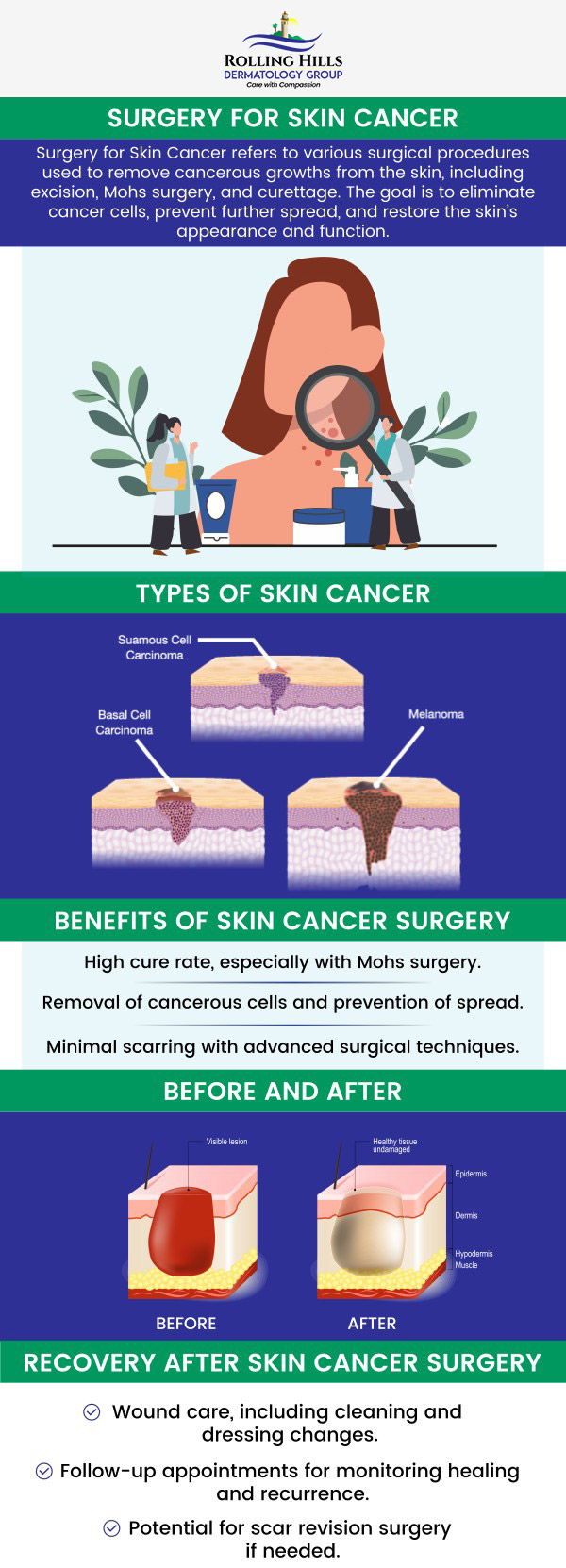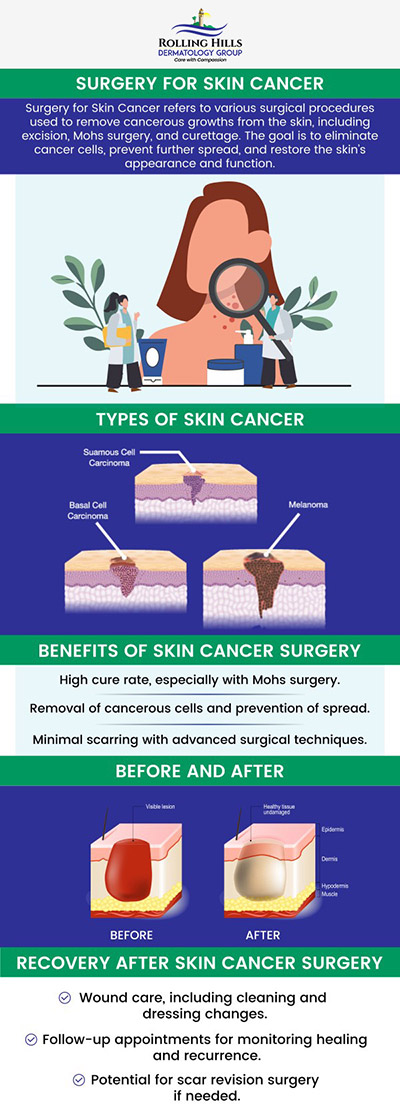Skin Cancer Surgery Specialist in Rolling Hills Estates, CA and Seal Beach, CA
Our specialists use advanced surgical techniques to remove cancerous growths while minimizing scarring and preserving healthy tissue. Trust Rolling Hills Dermatology Group professionals for safe care and compassionate treatment. For more information, contact us or schedule an appointment online. We have convenient locations in Rolling Hills Estate CA, and Seal Beach CA.




Table of Contents:
What types of skin cancer require surgery?
How do I know if I need skin cancer surgery?
What are the different types of surgical procedures for skin cancer?
How long does skin cancer surgery take?
Our team is experienced in diagnosing and treating various types of skin cancer, including Basal Cell Carcinoma (BCC), the most common type. We are skilled in performing simple excisions for superficial BCCs and can carry out more complex procedures, like Mohs micrographic surgery, for deeper tumors.
For those diagnosed with Squamous Cell Carcinoma (SCC), the second most common type of skin cancer, our dermatologists are proficient in conducting simple excisions as well as more advanced surgeries such as wide local excision or lymph node dissection, depending on the size and depth of the tumor.
In cases of melanoma, although less common, we understand the critical need for swift surgical intervention due to its ability to spread to other parts of the body. Our surgeons are adept at performing wide local excisions, adjusting the size of the surgical margin according to the stage of the cancer.
Lastly, for less common types of skin cancer, such as Merkel cell carcinoma, Dermatofibrosarcoma Protuberans, and Kaposi sarcoma, we are equipped to perform the necessary surgical procedures tailored to the specific type, location, and stage of the cancer.
If you observe any changes in your skin such as the development of new moles, alterations in existing moles or other skin growths, you should seek professional advice immediately. These changes could be early signs of skin cancer. Specifically, changes in size, shape, color, or texture, or if these skin features become itchy, painful, or start to bleed, can be indicative of skin cancer. Symptoms such as persistent or growing lesions, bleeding, ulceration, or crusting on a skin lesion can also signal skin cancer.
If you have been diagnosed with skin cancer in the past, we recommend regular check-ups with our team of expert dermatologists to catch any new developments early. Similarly, if you are at high risk of skin cancer due to factors such as a family history of skin cancer, a personal history of sunburns, fair skin, or a large number of moles, vigilance about checking your skin for any changes is essential.
Lesions larger than 6 millimeters in diameter or smaller lesions exhibiting other concerning characteristics can be suspicious. Satellite lesions, which are smaller lesions surrounding a larger one, may also signal the spread of cancer.
A biopsy confirming the presence of skin cancer usually leads to surgery as the primary treatment. The type of surgery depends on the type, size, depth, and location of the skin cancer, ranging from simple excisions to more complex procedures like Mohs surgery.
Our team is experienced in performing various surgical procedures, including excisional biopsy, wide local excision, Mohs micrographic surgery, curettage and electrodesiccation, laser surgery, excision and skin graft, and sentinel lymph node biopsy.
Excisional biopsy, which is often used when the diagnosis of skin cancer is uncertain or when the tumor is small and easily accessible, involves removing the entire tumor. We also conduct wide local excision, which involves removing the tumor with a surrounding margin of healthy tissue. This method helps to ensure complete removal of the tumor and reduce the risk of recurrence.
Our group also specializes in Mohs micrographic surgery, a highly precise technique that ensures the removal of skin cancer while conserving as much skin as possible. This method involves removing the tumor layer by layer and examining each layer under a microscope until no cancerous cells are found.
For small or superficial skin cancers, we use curettage and electrodesiccation. This method involves scraping the cancer with a curette and treating the base of the tumor with heat or an electric needle to kill any remaining cancer cells and control bleeding.
For larger tumors that require the removal of a significant amount of tissue, our skilled surgeons are adept at performing skin grafts. This procedure involves harvesting healthy skin from another part of the body and grafting it onto the excision site.
● Type and size of the tumor: The type of skin cancer, as well as the size and depth of the tumor, significantly impact the length of the surgery. Smaller, less aggressive tumors usually require shorter surgery times. In contrast, larger, more advanced tumors may require longer, more extensive procedures.
● Location of the tumor: Tumors positioned in areas with more skin and soft tissue, like the face or chest, often necessitate longer surgeries due to their sensitive nature.
● Surgical technique: The surgical approach we choose, such as simple excision, Mohs micrographic surgery, or radiation therapy, will also affect the duration. For instance, a simple excision can take as little as 15-30 minutes, while Mohs surgery can take several hours or even the entire day.
● Patient’s overall health: Your overall health can influence the length of the surgery. If you have underlying medical conditions, you may need additional time for preoperative preparation or postoperative recovery.
These are the expected time frames for common skin cancer surgeries:
● Excisional surgery: This surgery type involves removing the tumor and a margin of surrounding healthy tissue. It typically takes between 30 minutes to 2 hours, depending on the tumor size.
● Mohs micrographic surgery: This technique, used for irregularly shaped tumors or ones that have spread into the surrounding skin, can range from a few hours to an entire day.
● Radiation therapy: This non-surgical treatment uses high-energy X-rays or other types of radiation to kill cancer cells. Each session typically lasts 15-30 minutes and is repeated over several weeks.
At Rolling Hills Dermatology Group, we are committed to providing you with the highest level of care for skin cancer surgery. Our skilled team uses cutting-edge techniques to ensure optimal results while maintaining the health and appearance of your skin. Let us help you take the next step toward a healthier, cancer-free future. Contact us today to learn more or to schedule your consultation with our experts. We are here to support you at every stage of your treatment journey. For more details, contact us or book an appointment online. We serve patients from Rolling Hills Estate CA, Torrance CA, West Carson CA, Lomita CA, Palos Verdes Estates CA, Hermosa Beach CA, Manhattan Beach CA, Redondo Beach CA, Seal Beach CA, Rossmoor CA, Garden Groce CA, Santon CA, Westminister CA, and surrounding areas.

Additional Services You May Need






